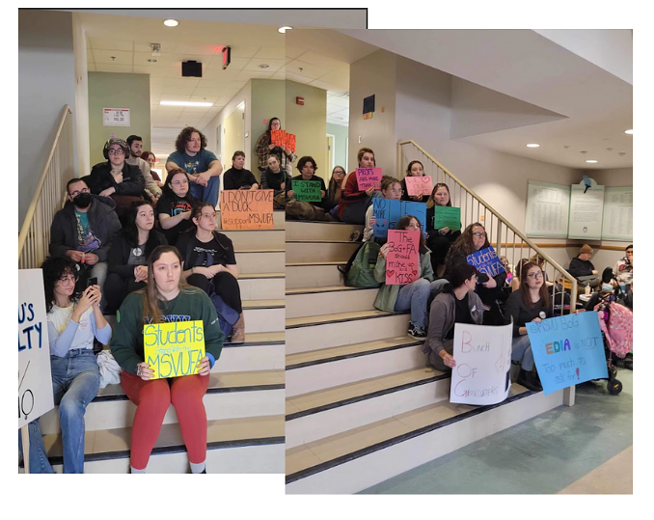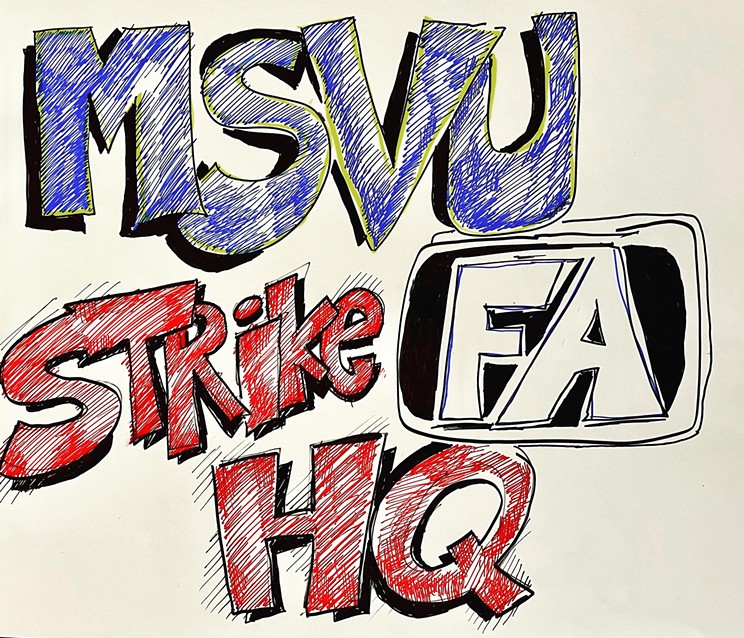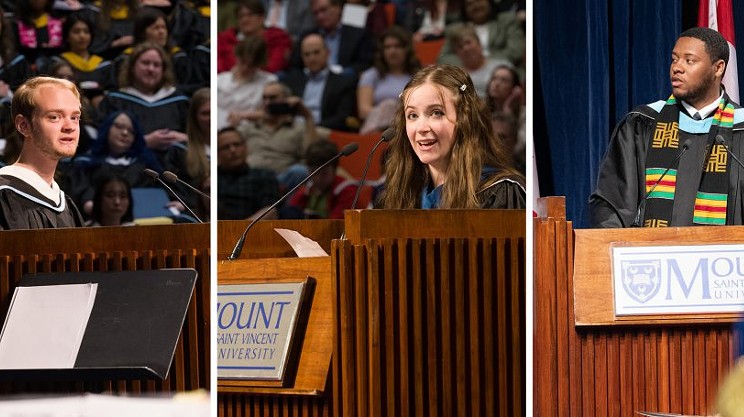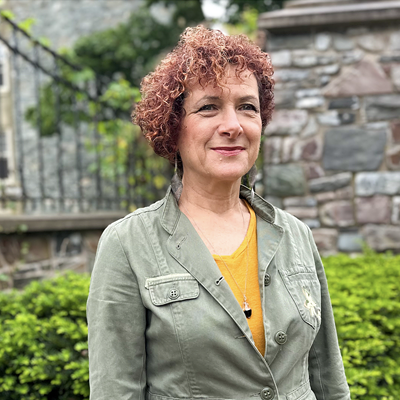As the noon gun sounded on Monday, members of the largest union at Mount Saint Vincent University went on strike after failing to reach an agreement with the school’s bargaining team over the weekend. The union, with approximately 160 members of full-time faculty, librarians and technicians, has been working without a collective agreement since June of last year.
Members of the MSVU Faculty Association walked the picket line beside students who carried signs reading “Faculty Holds MSVU Together” and “Student Solidarity with the MSVUFA.”

The MSVUFA has been in the process of negotiating a new collective contract with the university’s Board of Governors since the union filed their Notice to Bargain on May 12, 2023. However, negotiations were put on hold over the summer to allow time for hiring more administrators integral to the school’s bargaining team, including vice-president academic and provost, Lori Francis, and vice-president administration, Isabelle Nault. MSVU has a list of bargaining updates published on their website here under "Faculty and Staff Relations."
Union spokesperson Jeff MacLeod says the Board of Governors’ bargaining team further delayed a negotiations in the fall by not submitting their financial proposal until January.
“In one sense, bargaining didn’t really get going until then,” says MacLeod. He says that although it’s not abnormal for the old agreement to lapse before the new one is signed, “there's usually an agreement by September or October.” He says that's the latest it usually goes. In 2018, it went longer—for six months into early January. “That was really abnormal,” says MacLeod, “and to have it go this long and have such little progress is entirely unprecedented.”
Nault, who was hired in July 2023, says this bargaining timeline isn’t unique. The MSVUFA submitted more proposal points than usual, says Nault, which requires more time to review. “It’s not a rush process; It's a contractual agreement and we have the intent to reach one for the benefit of everyone.”
Negotiations showed early signs of trouble when the union asked for “conciliation” on October 24, 2023. That’s a process the union files for with the provincial Department of Labour, Skills and Immigrations to have provincial conciliators meet with both teams and work with them to reach an agreement. Normally, says MacLeod, bargaining teams for the MSVUFA and the board meet by themselves. It’s only if they reach an impasse that the union files for conciliation, which they activated in November 2023.“Not a lot of goodwill there.”
tweet this
In advance of the first conciliation session Jan. 9, the union’s members voted 97% in favour of exercising their legal right to strike if this last bargaining effort failed.
In a news release from the MSVUFA on Jan. 29, union president Susan Brigham said, “The collective bargaining process has been frustrating and disappointing as the Board of Governors has been dragging its feet. The board did not come to the table in the summer, choosing instead to wait months after the collective agreement expired.”
The union’s bargaining team is led by their negotiator, Geneviève Boulet. The board’s team is led by an outside lawyer hired to represent the board at the table, “despite the fact they have three vice-presidents, two associate vice-presidents, several deans,” says MacLeod, calling it “a very robust administration considering our size.” In MacLeod’s 20 years at the Mount, he doesn’t recall a time when the Board used an outside lawyer rather than an MSVU employee as their lead negotiator.
Whatever the lawyer’s fees, the university is paying for it out of its operating budget. In the last fiscal year ending Mar. 31, 2023, MSVU received $21.5 million from the province and nearly $35 million in tuition and student fees towards its operating grant.
Says MSVU’s vice president administration, Nault, “There’s a cost to bargaining regardless if it’s a lawyer, an external consultant or even an internal staff member…there’s always a cost to bargaining.”

The main focus of this new agreement has been on implementing policies on decolonization and on equity, diversity, inclusion, and accessibility (EDIA) into the contract.
Says the MSVUFA release from Jan. 29, “at an institution that promotes itself as a champion for social justice, ‘challenging the status quo since 1873’, it is even more disappointing that the board is failing to enact its values, encompassed by its core mission, within its own community.”
Strike at MSVU begins over compensation & EDIA principles. Urging Board for collaborative resolution. Let’s uphold MSVU’s vision. #supportMSVUFA pic.twitter.com/T1vRlscbb8
— @MSVUFA (@MSVUFA) February 12, 2024
When it comes to sticking points between both bargaining sides, MacLeod says there are a lot. “I think they’ve come to an agreement on maybe four articles. Three are just administrative, not substantive. There's very little agreement right now on any of the proposals we put forward at the beginning of the process, and it’s a long list.”
The union has made over 25 proposals on language that would enshrine EDIA into the collective agreement and those are the main points, says MacLeod. “Financials, yes, but financials are linked to EDIA” which is the more important aspect in some ways, MacLeod says.
The MSVUFA’s notes on ongoing negotiations include the following:
“Pay equality for all…[plan for adjusting salaries over time] upon hiring of Indigenous and equity-deserving members for their first voices, perspectives, and experiences…
"Course release for indigenous and equity-deserving members for their extra service in supporting our institution to diversify our academy…extending the range of scholarly and professional activity in reappointment, tenure/permanence, promotion to include diverse forms of knowledge...
"[And] provide stipends and course releases to chairs and their departments who have seen a significant increase in the administration of programs.”
MacLeod says most of their points have been flat out ignored. Both sides have gotten stuck on including a land acknowledgement in the agreement, for example.
Says Nault, “It’s our belief that it's not the best way to address truth and reconciliation because the collective agreement is a contractual document. It's not because we aren’t working with all our efforts for truth and reconciliation. But we counter-proposed other ideas that are being evaluated at this moment.”
Nault says the university’s side is committed to following through on an EDIA mandate. “It’s part of our mission–we just need to continue working on the agreements and working so we can implement these clauses fairly and consistently. We live with this agreement, so we’re working through each article one at a time and we haven’t rejected any.”
When the university webpage states they are "...committed to efforts that advance EDIA...", but then deny collective agreement clauses that actually advance EDIA. Hmmmm. Standing with you @MSVUFA https://t.co/kcWsD5KmtB
— ANSUT (@ANSUT_Tweets) February 8, 2024
The board at MSVU is large, approximately 25 to 30 members from a variety of backgrounds, but mostly lawyers and business people from the private sector, says MacLeod. In their position at the bargaining table, “it sounds like they’re taking a really hard line on all EDIA issues,” which is setting a dynamic of “obstruction and obfuscation,” he says.
In normal bargaining scenarios, an agenda would be set for the day’s meeting with proposal points to discuss by both sides. The union presents their point, the board would look at it and respond by saying they agree or don’t, or amend the language to reach an agreement. Normally.
But in this process, “it's been a lot of stonewalling, ignoring and not a lot of active communication,” says MacLeod. “Not a lot of goodwill there.”
On Feb. 7, MSVUFA president Susan Brigham told the province’s minister of labour, skills and immigration and MSVU president Joël Dickinson the union was prepared to strike on Monday Feb. 12 if conciliation failed.
It has. Both sides will remain at the bargaining table until an agreement is reached. MacLeod says negotiations can go from 8am to midnight, as they have before. Both sides are hoping for an agreement soon to end the strike, but one that's a fair deal.
The administration published strike protocols Feb. 8 to explain the ins-and-0uts during the union's job action. One rule is that union members on sick leave or sabbatical are not automatically exempt from strike duties thus making them return from leave and lose job compensation, or lose strike pay and forfeit the strike for the union.
Nault “We've presented strike protocols which are meant to cover a wide variety of scenarios.
"As it relates to health issues, medical research or other reasons. They can request exceptions and we'll review them with compassion."
"We do care about our faculty," says Nault. "They're working hard for our students and for institutions. The intent of the strike protocol is to lay down rules so everybody understands what is going on.”
Says Nault, "Our protocols are in line with what you will find at other institution and, to date, we have received very few requests [for exception] thus far.”
We at MSVU learned today of our strike protocol should an agreement not be reached by Monday. The employer has refused to excuse employees ON SICK LEAVE. I just can't wrap my head around this. THE ABLEISM! The damage done is extraordinary, even if we reach an agreement.
— Martha Walls (@melizwalls) February 8, 2024
MacLeod says the union has no legal recourse against that because the university has the power to decide to do that. “The fact that they do it just shows their character.”
The MSVUFA will be striking Monday through Friday everyday from 7:30am to 5:30pm, splitting the day into two shifts and sharing duties across it’s nearly 160 members—with picketing support from students and faculty unions from other schools.
Earlier this month, the province announced new one-year agreements with universities, including MSVU, that change the way operating grants are handed out: universities must show their work on how they're matching spending to provincial priorities or risk losing access to funds.
Will striking for a fair deal put the Mount ahead of the curve? There's hope.














